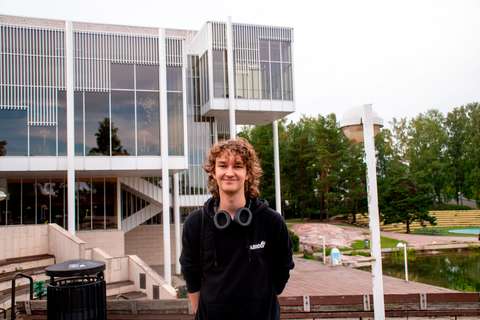From mathematician to musician
Pessi Heiskanen graduated from Tapiola Upper Secondary School last spring and is now studying at Pop & Jazz Conservatory. The road to this point has been far from straight and ordinary.
At first, it looked like Pessi was supposed to become a Master of Science in Technology. “I did my lower secondary school in a mathematics class at the Mankkaa school. I was and still am really good at mathematics,” Pessi says. He had success in national mathematics competitions—and that success led him to his next place of study. “I ended up studying in the STEM specialisation at Otaniemi Upper Secondary School. I have Masters of Science in Technology in my family, so I would’ve followed their steps.” The way would have been clear: From Tapiola to Aalto University of Technology, then to work for either the university or one of the companies in Keilaniemi. But...
After starting in Otaniemi Upper Secondary School, Pessi began to have second thoughts. He had played music his whole life (“I started in music playschool when I was a baby”). “My classical music studies at EMO (Espoo Music Institute) ended when I moved to upper secondary school. At the same time when I started upper secondary school, I started my piano studies at EMO’s pop/jazz department Ebeli. There I got the taste for popular music, especially jazz, and I really got into the idea about music as a potential profession.”
From there, the wheels were set in motion, and suddenly the upper secondary school had changed from Otaniemi to Tapiola in the middle of the first year. “Friends who had already studied in the music specialisation were a big bonus that may have got me over the threshold of daring to try to change upper secondary schools.”
There is something in common between the previous field and the current one: “Many mathematicians are musicians, but the opposite is true less often. Music theory requires mathematical understanding. Music also requires the same perseverance needed in solving mathematical problems: you have to practise a lot to be good at it,” Pessi sums up. Music does not feel like work to him, however.
An active youth
In Tapiola Upper Secondary School, Pessi praises the active approach and the benefits of a relatively small group. “Although I wasn’t that experienced when I started there, I was able to do things from the start by, for example, participating in musicals, bands and singing.”
Pessi has also been active in other areas than music. “I was on the student body board in lower secondary school and then in the youth council from ninth grade to the second grade of upper secondary school. Through that, I was part of a working group for the upper secondary school’s new curriculum. Maybe I’ll go back to politics when I’m older, but now it doesn’t inspire me.”
However, even though Pessi left politics, he did not stop striving to make a difference. In upper secondary school, Pessi acted as a tutor. “In the mathematics class in lower secondary school, having shared activities across age groups was a nice experience. I wanted the same in upper secondary school. Many of those going to upper secondary school may be shy, and I wanted to make the beginning easier for them.”
You can see the world in upper secondary school—or at least Europe. Pessi warmly recommends upper secondary school travel courses. During his studies, he was able to see Europe on three trips. “In the second year of upper secondary school, I visited Poland and Rome (the Poland trip was postponed from the first year to the second year due to COVID-19), and in the third year I visited Amsterdam.”
Friends are the best
What was the best thing about upper secondary school? “Friends. Dumb and funny things you do with your friends. Studying is sometimes tough, but all of us were in the same boat. The best thing about upper secondary school was the sense of community and the group spirit, you could even say ‘brotherhood’.”
Pessi’s matriculation examination went very well, and his math skills did not get rusty in musical circles. But as a musician, how many laudatur grades you have on your certificate does not really matter in the end. “What matters is that I can play and sing, not what kind of grades I have got.”
Think about what you want and why
In Pop & Jazz Conservatory, Pessi’s main instrument is the piano. He has a band called Säilä with his brother and friends. The band’s style is a little difficult to define: “Rock, jazz fusion, indie rock, something like that,” Pessi says.
Pessi is sure that music will provide for him, although the profession often feels uncertain: “I’m ready to work hard for music.”
Pessi has a few tips for ninth-graders: “You should think about what you want. It’s even more important to consider why you want what you want. It’s good to be honest with yourself.”
